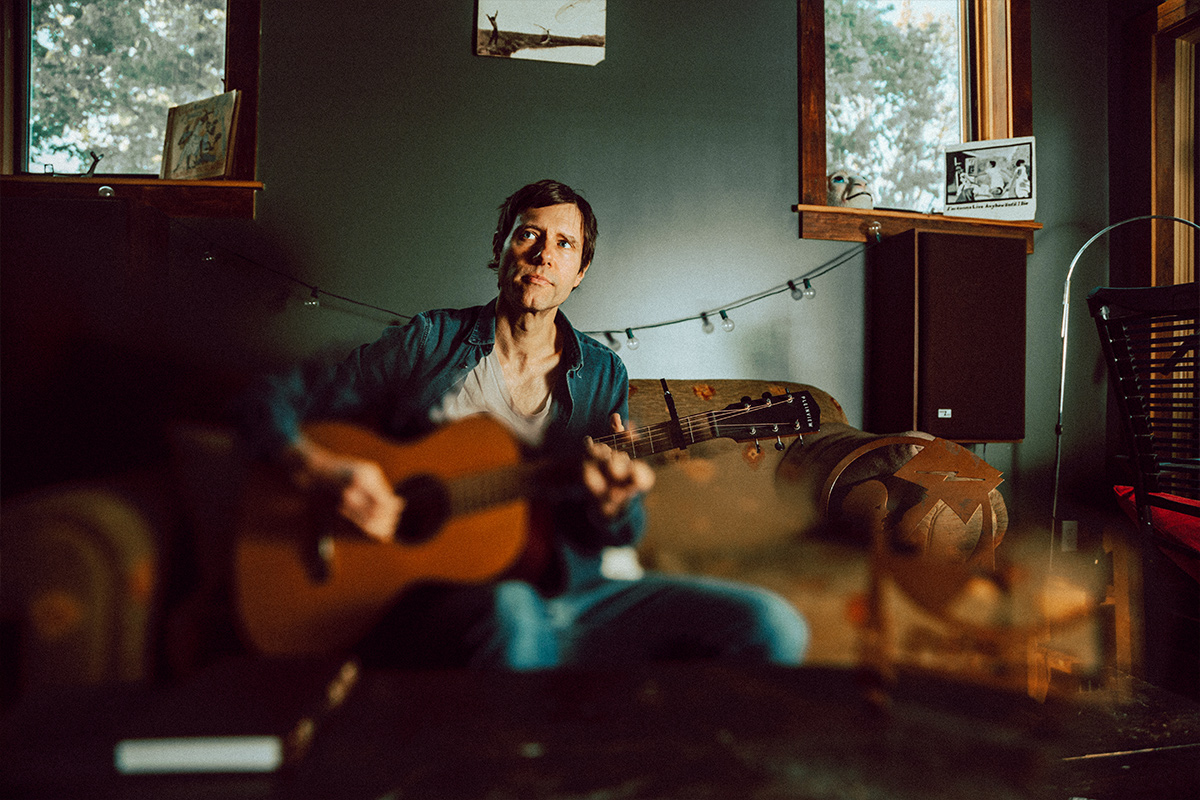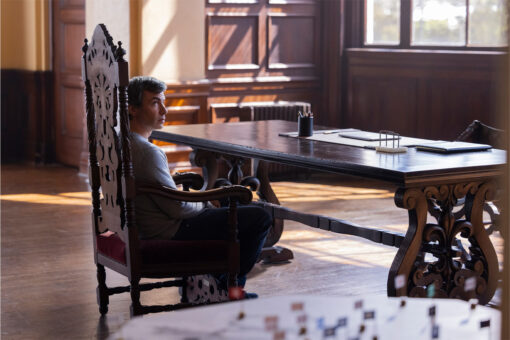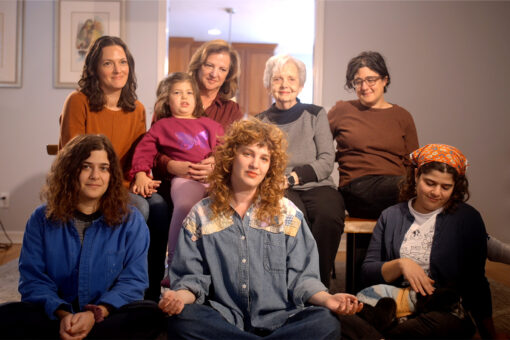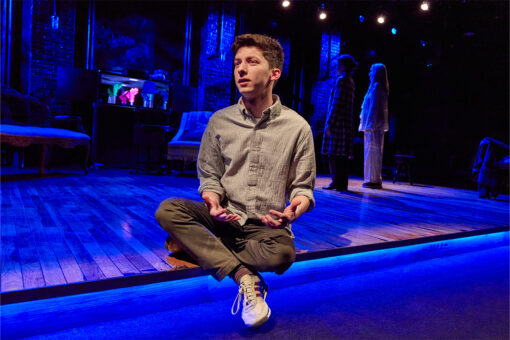Nathan Salsburg started playing guitar at Jewish summer camps, picking out old Debbie Friedman songs beside the campfire. Decades later, he’s one of the most acclaimed solo folk guitarists of his generation and the archivist for the late musicologist Alan Lomax’s vast archive of vinyl records.
Few musicians can be said to engage more deeply with the last century-plus of recorded music than one whose literal job is to rummage through thousands of old records. But for many years, Jewish music was only peripheral to his work: something he listened to on old klezmer recordings, but not something he found himself playing or engaging with on a physical level.
That’s changed over the last five years, when Salsburg began setting Hebrew psalms to music and traveling from his Louisville home to Chicago to record them with some friends in the left-field folk community. His new album “Psalms” is the first record where he’s taken the mantle of lead singer — and it’s almost entirely in Hebrew.
Elegant, stately and baroque, “Psalms” has just the right candlelit atmosphere for its subject matter. The term “symphony to God” gets bandied around a lot in rock criticism, usually to describe something faintly Christian. Here’s one from a Jewish angle.
The guitarist described the “Psalms” sessions as being “like a minyan,” despite many of his collaborators on the record — drummer Spencer Tweedy, veteran folk-rock weirdo Will Oldham, his wife Joan Shelley — not being Jewish.
“Psalms” came out in August on No Quarter Records, preceded by two stunning and strange albums called “Landwerk” on which Salsburg played guitar over sampled and layered loops mostly sourced from old klezmer recordings. These three works add up to one of the most creative and idiosyncratic bodies of modern Jewish music in recent memory. We caught up with the guitarist to discuss his latest.
This interview has been lightly condensed for clarity.
Tell me about your history as a singer.
Apart from singing as a young person at assorted summer camps — a Quaker camp in Pennsylvania, a Jewish camp in Indiana — my only concerted attempt to be a singer for any practical purpose was in some recordings I made with a squarely mediocre folk-rock band I played with in the late ’90s. I hung that up for some time and, before “Psalms,” I sang occasionally on my solo records and in my live sets primarily to break up what I felt might be the tedium of unbroken solo guitar. Those were songs I found joy in singing, but I didn’t think I’d ever make an album on which I was the singer.
What about your history with the Hebrew language? I understand you don’t speak Hebrew — what were the challenges of writing and singing in a different language?
Growing up, I got the standard bill of fare provided by Reform congregations, summer camps and youth groups. In college, I became really interested in translations of both the medieval Hebrew works of poet-philosophers Judah Halevi, Moses ibn Ezra and Solomon ibn Gabriol and the modern Hebrew of writers like Amos Oz, Yehudah Amichai, Yehudit Hendel and Amos Kenan, but it barely (if ever) occurred to me that I might learn to read or speak the living language.
The benefits of singing in Hebrew far outstripped the challenges. Foremost was that not being a hugely confident singer, I felt I could do some hiding behind its foreignness, both personally and to most listeners. I felt somehow less vulnerable with it, through it.
Some of the musicians on the record are Jewish and some aren’t. How easy was it to communicate your intent to the non-Jewish musicians?
I explained my motivations for the project to both the Jewish and non-Jewish contributors, so they knew what they were contributing to, but none of the musicianship required any specifically Jewish approach, sensibility or understanding, nor did I attempt to impart any. I think if it did, I’d have been making the wrong record.
Why these particular psalms and poems? How many songs did you write before coming up with the final tracklist for this album?
I suppose I composed 13 or 14 complete pieces from psalm texts, with assorted other fragments — a line or verse here and there — and settled on the final songs because they were the most rewarding to sing and to play. The one non-psalm, “O You Who Sleep,” is a lightly finessed adaptation of a Raymond P. Scheindlin translation of a Halevi poem; I just happened to read it at some point in the process and it resonated totally with the project, as well as with my current state of mind and heart. I started playing along with it, so to speak, and it felt too relevant to leave off the record.
One of my favorite things about the album is all the string and woodwind arrangements. How did those come together?
Those are entirely the work of my dear friend and collaborator James Elkington. He wrote all the arrangements, and then guided the players (all of whom recorded themselves remotely) over several of the darkest months of the pandemic. Jim also organized and directed the rhythm section — Nick Macri on bass and Spencer Tweedy on drums — in Chicago in late February of 2020, just before everything ground to a halt. I’m inexpressibly indebted to him. His “co-producer” credit hardly cuts it.
Can you elaborate on the spiritual elements of your creative process?
The closest I get to the experience of being created b’tselem elohim, in the image of the divine, is when I am making music, alone or with a sympathetic group of others. I don’t read or write staff notation, and my compositional practice — when it’s going well, which I freely admit is rarely — requires maneuvering around my mind and attaining a state beyond and above its habitually prosaic perambulations. It’s playing in this vaguely meditative state where I find melodies and connective melodic tissue I never would have thought of, but have instead encountered because I wasn’t fully consciously looking for them. That’s the closest I’ve yet to get to experiencing, perhaps embodying, emanations from the divine. (Not counting psilocybin use.)
If a Jewish summer camp called you and said they wanted to make one of your “Psalms” part of their repertoire, how would you respond?
If I had the chance to contribute to that “tradition,” for lack of a better term, I’d be thrilled! There are some wonderful songs in it, and also plenty of banal tripe. My music falls somewhere along that spectrum.



